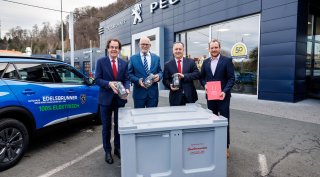
Safe and sustainable: Saubermacher optimises the battery cycle for e-mobility
New Battery Regulation from February 2024
The EU Battery Regulation, applicable from 18 February 2024 onwards, imposes far-reaching environmental requirements along the entire lifecycle, not just for electric vehicle batteries but for all types of batteries. These requirements relate to aspects such as carbon footprint, longevity, removability or interchangeability, the use of recyclate as well as collection, reuse and end-of-life recycling. This presents auto manufacturers with new challenges and new responsibilities. Importers or initial distributors are responsible for the return or disposal of their batteries as part of extended manufacturer responsibility. Their dealers and contract workshops must ensure that suitable collection infrastructure is in place and take back used batteries of any origin and composition on site, without charging for the service. In addition, they will also be obligated to implement strict safety measures and ensure proper documentation for authorities, insurers, etc.
Important goals of the new EU Battery Regulation are ambitious recycling efficiencies and recycling rates. As an example, for lithium batteries, 65 per cent of the average weight must be recycled within three years, and 70 per cent within eight. Here, the starting point is proper and safe storage as well as professional collection of e-batteries at different collection points, such as vehicle workshops.
Future demand for recycled raw materials
Although the recycling of electric vehicle batteries remains uneconomical on account of high recycling costs and small quantities, there is no way around it. The need for scarce raw materials is constantly on the rise. In Europe, however, there are no suitable raw materials deposits. More than 70 per cent of all cobalt comes from the Democratic Republic of Congo, with some mining occurring under questionable conditions and with around three quarters of all mines in Chinese ownership. There are lithium deposits in Europe, but mining them is problematic. Rising prices for raw materials also have an impact on the market. That’s why it’s increasingly important to keep primary raw materials, such as cobalt, nickel and lithium, fully within the chain. The new EU Battery Regulation takes these circumstances into consideration.
Sustainable complete solution for the electric vehicle industry
In the year 2023, nearly 50,000 electric cars were newly registered in Austria, equivalent to 20 per cent of new registrations in the year before. In total, there are some 155,000 electric cars on Austrian roads.[1] The boom in electric vehicles not only has a major impact on the waste disposal industry, but dealerships and workshops face major challenges too. The processes relating to the handling of electric vehicle batteries are not yet regulated with sufficient clarity, or even defined, which causes problems in case of accident, repair or replacement. The new EU Battery Regulation steps in to provide specifications. The requirements and their implementation are both complex and cost-intensive.
This is exactly where Saubermacher Battery Services, a joint enterprise between Denzel, Porsche Austria and Saubermacher, comes in, offering support with a unique complete solution for workshops and dealerships.
Manufacturers and importers can also transfer their responsibility directly to waste management firms with the right skills and authorisations. Saubermacher Battery Services offers this service across Austria for all import companies and possesses both the requisite experience in handling and the infrastructure to provide support nationwide. In addition to disposal and treatment services, we can also provide innovative quarantine containers and storage boxes.
Klaus Edelsbrunner, federal committee chairman of the Austrian chamber of commerce, vehicle trade division, supported the joint initiative, which was initiated in 2022 and relies on the services of Saubermacher Battery Services: “The process with a reliable partner who takes care of processing and thus simplifies everything for companies was a major determinative factor for me. In addition, as a specialist, Saubermacher ensures that processing is legally compliant, not just for companies but ultimately customers as well. The costs can also be structured flexibly with different packages.”
Stefan Hutschinski, Austrian chamber of commerce functionary in the vehicle trade division and owner of several car dealerships in Vienna, has every confidence in the solution: “The service that Saubermacher provides in this field is extremely valuable to auto companies across Austria. It saves us all from having to make huge investments in infrastructure that would have likely only got used on occasion. When you consider the current pace of development in this area, this sets the high standards that are needed in terms of safety and environmental protection – for our companies, authorities and ultimately, our customers!”

Operational approval creates uncertainty
One especially complex hurdle for auto companies is the set of challenges relating to operational approval for high-voltage activities. All dealers and workshops that repair electric vehicles must have this approval. Lengthy processes pursued by authorities and the discrepancies between different offices impede the process. Saubermacher Battery Services can provide advice and support here too with its expertise. The focus is always employee safety and protecting business processes. Proper collection and storage of lithium-ion batteries contribute to workshop safety, ensure compliance with legal requirements and make a significant contribution to climate protection as part of e-mobility.
Hans Roth, founder of Saubermacher, provides affirmation: “I welcome the new Battery Regulation and its goal of closing the battery cycle. Saving and reusing valuable and rare raw materials are important targets when it comes to the transport and energy transition. We are eager to fulfil our responsibility and support auto companies in the best way we can. I would like to thank Mr Edelsbrunner and Mr Hutschinski and their companies for these innovative partnerships.”
Links to further information:
- Press release “New Saubermacher Battery Services GmbH completes circular economy for e-mobility”
- Overview of the new EU Battery Regulation, Austrian chamber of commerce
press release
Contact
For press inquiries please contact:



